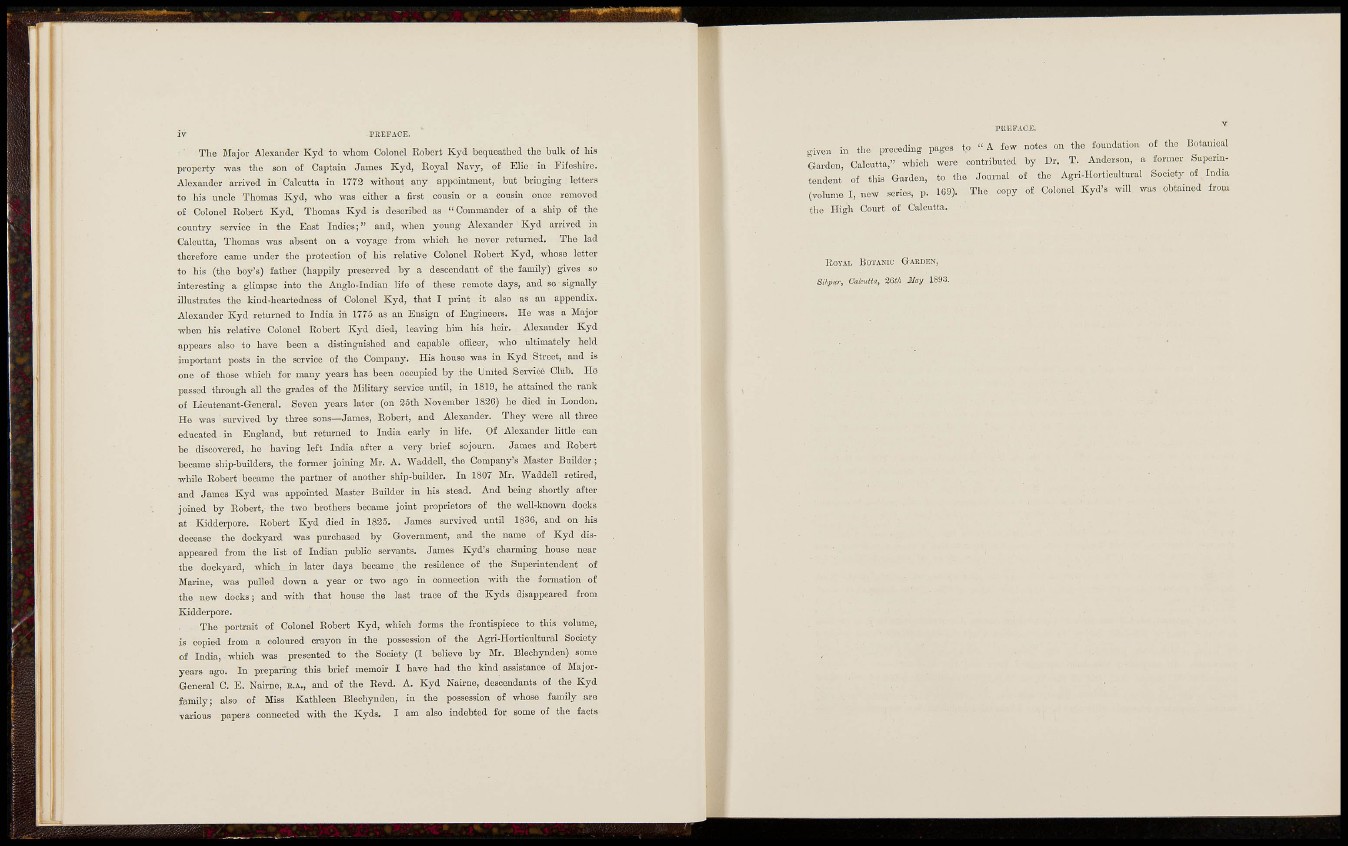
The Major Alexander Kyd to whom Colonel Robert Kyd boqneathed tho bulk of his
property "was the son of Captain James Kyd, Eoyal Navy, of Elie in Fifeshire.
Alexander arrived iir Calcutta in 1773 without any appointment, but bringing letters
to his uncle Thomas Kyd, who was cither a first cousin or a cousin once removed
of Colonel Eobert Kyd. Thomas Kyd is described as "Commander of a ship of the
country service in the East Indies;" and, when young Alexander Kyd arrived in
Calcutta, Thomas was absent on a voyage from which ho never retaniod. The lad
therefore came under the protection of Ms relative Colonel Robert Kyd, whoso letter
to his (the boy's) father (happily preserved by a descendant of the family) gives so
interesting a gUmpso into the Anglo-Indian life of these remote days, and so signally
illustrates the kind-heartedness of Colonel Kyd, that I print it also as an appendix.
Alexander Kyd returned to India in 1775 as an Ensign of Engineers. lie was a Major
when his relative Colonel Eobert Kyd died, leaving hhn his heir. Alexander Kyd
appears also to have been a distinguished and capablo oflicer, who ultimately held
important posts in the service of the Company. His house was in Kyd Street, and is
one of thoso which for many yeai-s has been occupied by the United Service Club. He
passed through all the grades of the Military service until, in 1819, he attained the rank
of Lieutcnant-Öeneral. Seven year's later (on 3äth Kovember 1828) ho died in London,
Ho was survived by tlu-ee sons—James, Eobert, and Alexander. They were all three
educated in Errgland, but returned to India early in life. Of Alexarrder little can
be discovered, he having left India after a very brief sojourn. James and Kobert
bocame ship-buildors, the former joining Mr. A. Wadddl, the Company's Master Bnüder ;
while Robert became the partner of another ship-bnilder. In 1807 Mr. Waddell retired,
and James Kyd was appointed Master Builder in his stead. And being shortly after
joined by Eobert, the two brothers became joint proprietors of the well-known docks
at Kidderpore. Robert Kyd died in 1830. James survived until 1836, and on his
decease the dockyard was purchased by Government, and the name of Kyd disappeared
from the list of Indian public servants. James Kyd's charming house near
the dockyard, which in later days became. the residence of the Superintendent of
Marine, was pulled down a year or two ago in connection with the formation of
the new docks; and with that house the last trace of the Kyds disappeared fronr
Kidderpore.
The portrait of Colonel Robert Kyd, which forms the frontispiece to this volume,
is copied from a coloured crayon in the possession of the Agri-Horticultural Society
of India, which was presented to tho Society (I believe by Mr. Bleohynden) some
years ago. In preparing this brief memoir I have had the kind assistance of Major-
General C. E. Naime, E.A., and of the Eevd. A. Kyd Nairne, descendants of tho Kyd
family; also of Miss Kathleen Bleohynden, in the possession of whose family are
various papers connected with the Kyds. I am also indebted for somo of the facts
PREFACE.
„iven in tho preceding pages to " A few notes on the foundation of the Botanical
L r d e n , Calcutta," which were contributed by Dr. T. Anderson, a former Supermtendent
of this Garden, to the Journal of the Agri-Horticultui-al Society of India
(volume I, new series, p. 100). The copy of Colonel Kyd's will wbs obtained fronr
{he High Court of Calcutta.
ROYAL BOTANIC GARDEN,
Sil'pur, Calcutta, 26iA J/ny 1893.